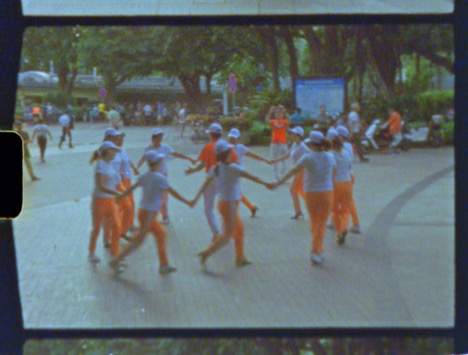Lee Kai Chung performs artistic research on archival histories, infrastructural remains, and ideology through performance, moving image installations, publications and public programmes. In this talk, Lee will share excerpts from his most recent videos, such as Tree of Malevolence (2023-) – a project that explores the multiple roles played by intelligence operatives in British Hong Kong and Guangzhou during the Cold War. Interweaving personal testimony, interview transcripts, critical fabulation and archival records based on key historical events, it traces the story of ‘Y’, a secret agent and forestry officer tasked with organising The People’s Republic of China’s first urban greening project for the international Canton Trade Fair in the late 1950s. Amidst the chatter of traders from British Hong Kong, Macau and foreign countries, the video unveils the complexities of human nature and individual agency in a period of Maoist collectivism and wider geopolitical power struggles. Tree of Malevolence is a prelude to Lee’s overarching project The Cold Mountain (2021-) which delves into the history of China’s international relations in the Cold War period as well as the resulting environmental degradation across Eurasia.
The artist’s longstanding interest in historical erasure, colonialism, ecology and agency is reflected in his previous work, such as the highly regarded ‘Displacement’ series, which includes The Retrieval, Restoration and Predicament (2017-19) a piece that tracks the material and ideological transformation of public statues in Hong Kong; The Narrow Road to the Deep Sea (2019-20) which centres on the necropolitics of the Nanshitou Refugee Camp in Guangzhou during the Japanese occupation; and The Infinite Train (2021 -) – a hauntological study of the ruins of the Japanese Empire’s mega-infrastructural project, the Great Eastern Railroad, in Manchuria. Lee will speak about his ‘archival methodology’ and research-based practice, addressing some of the challenges of excavating concealed histories of transgression and agency in a ‘post-truth’ age.
Lee Kai Chung is an artist and researcher who lives between London and Hong Kong. His recent exhibitions include ‘Sharjah Biennial 15: Thinking Historically in the Present’ (UAE, 2023) and ‘Wandering, Walking’ (Gwangju Asia Culture Center, 2023). In 2016, Lee established the collective ‘Archive of the People’, which serves as an extension of his personal research and includes collaborative projects, education and publications. In collaboration with curator Shen Jun, Lee founded stepbackforward.art and PhantomArchives.com in 2020 and 2022 respectively: the former is an online platform collecting artist archives, fragmented thoughts and artist methodology; the latter extends Lee’s “Displacement” series to a public domain, constituting an online archive that embraces public participation. He was awarded Honourable Mention at the Sharjah Biennial 15 and the Taoyuan International Art Award in 2023; The Robert Gardner Fellowship in Photography from Peabody Museum of Archaeology and Ethnology of Harvard University in 2022; the Altius Fellowship from Asian Cultural Council in 2020 and the annual Award for Young Artist (Visual Arts) from Hong Kong Arts Development Council in 2018.
This is the second event in The 2024 Asymmetry Distinguished Lecture Series, ‘Critical Habitats’, convened by Dr Wenny Teo, Senior Lecturer in Modern and Contemporary Asian Art at The Courtauld, and Michèle Ruo Yi Landolt, Director, Asymmetry.






